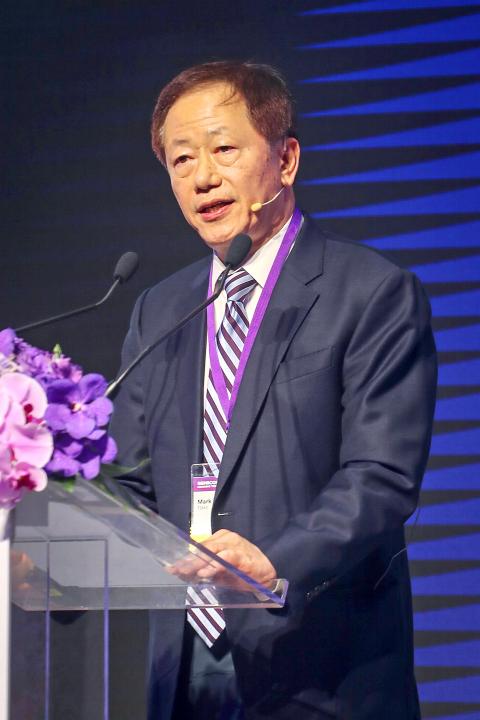Taiwan Semiconductor Manufacturing Co (TSMC, 台積電) chairman Mark Liu (劉德音) yesterday said that he is optimistic about the semiconductor industry’s future growth, as Moore’s Law is alive and well, and should continue to drive industry growth.
Data from international trade group SEMI showed that over the past six decades, global semiconductor revenue has grown to US$480 billion, following the path of Moore’s Law, former Intel Corp CEO Golden Moore’s observation that the number of transistors on a microchip doubles every two years, while the cost per transistor is halved.
Debates have been going on whether a slowing of that ratio would hamper the industry’s growth.

Photo: CNA
“People have asked: Will semiconductors evolve for another 60 years? I’m optimistic about this,” Liu said in a speech to a think tank summit organized by SEMI in Taipei as part of the three-day SEMICON Taiwan show at the Taipei Nangang Exhibition Center, which opened yesterday.
“To TSMC, Moore’s Law is alive and well,” Liu said.
TSMC’s 7-nanometer process technology entered its second year of mass production this year and its 5-nanometer technology is to begin mass production next year, Liu said.
“Next year, we will see rapid expansion for our 5-nanometer technology. Now we are concentrating our research and development efforts on 3-nanometer,” he said.
“We are also making encouraging progress in developing 2-nanometer technology every week. We are entering the ‘pathfinding’ mode [early research and development stage],” he added
“Someday, if everyone has a quantum computing device in his or her pocket, I believe TSMC will not be absent [from that technology]. I believe the development of semiconductors will continue to unfold,” Liu said.
However, a shortage of qualified engineers and other professionals could hamper the industry’s development more than technological barriers, he said.
To create a larger talent pool in Taiwan, Liu called on the government to increase its national technology research budget to encourage university professors and students to engage in semiconductor research.
“Technological leadership is the only way for Taiwan’s semiconductor industry to survive,” Liu said.
Meanwhile, Minister of Economic Affairs Shen Jong-chin (沈榮津) told the summit that the government has approved TSMC’s environmental impact assessment for a new 2-nanometer fab in Hsinchu.
In a separate forum organized by SEMI, TSMC vice president of corporate research Philip Wong (黃漢森) said that with the evolution of Moore’s Law, the company might offer 2-nanometer and even 1-nanometer technology.
However, the technological evolution might not be defined by the technology node, or by the transistor’s geometry, but rather by chip density, Wong said.
Higher chip density helps drive costs lower, while elevating chip performance, he said.

STEEP DECLINE: Yesterday’s drop was the third-steepest in its history, the steepest being Monday’s drop in the wake of the tariff announcement on Wednesday last week Taiwanese stocks continued their heavy sell-off yesterday, as concerns over US tariffs and unwinding of leveraged bets weighed on the market. The benchmark TAIEX plunged 1,068.19 points, or 5.79 percent, to 17,391.76, notching the biggest drop among Asian peers as it hit a 15-month low. The decline came even after the government on late Tuesday authorized the NT$500 billion (US$15.2 billion) National Stabilization Fund (國安基金) to step in to buoy the market amid investors’ worries over tariffs imposed by US President Donald Trump. Yesterday’s decline was the third-steepest in its history, trailing only the declines of 2,065.87 points on Monday and

TAKING STOCK: A Taiwanese cookware firm in Vietnam urged customers to assess inventory or place orders early so shipments can reach the US while tariffs are paused Taiwanese businesses in Vietnam are exploring alternatives after the White House imposed a 46 percent import duty on Vietnamese goods, following US President Donald Trump’s announcement of “reciprocal” tariffs on the US’ trading partners. Lo Shih-liang (羅世良), chairman of Brico Industry Co (裕茂工業), a Taiwanese company that manufactures cast iron cookware and stove components in Vietnam, said that more than 40 percent of his business was tied to the US market, describing the constant US policy shifts as an emotional roller coaster. “I work during the day and stay up all night watching the news. I’ve been following US news until 3am

Six years ago, LVMH’s billionaire CEO Bernard Arnault and US President Donald Trump cut the blue ribbon on a factory in rural Texas that would make designer handbags for Louis Vuitton, one of the world’s best-known luxury brands. However, since the high-profile opening, the factory has faced a host of problems limiting production, 11 former Louis Vuitton employees said. The site has consistently ranked among the worst-performing for Louis Vuitton globally, “significantly” underperforming other facilities, said three former Louis Vuitton workers and a senior industry source, who cited internal rankings shared with staff. The plant’s problems — which have not

TARIFF CONCERNS: The chipmaker cited global uncertainty from US tariffs and a weakening economic outlook, but said its Singapore expansion remains on track Vanguard International Semiconductor Corp (世界先進), a foundry service provider specializing in producing power management and display driver chips, yesterday withdrew its full-year revenue projection of moderate growth for this year, as escalating US tariff tensions raised uncertainty and concern about a potential economic recession. The Hsinchu-based chipmaker in February said revenues this year would grow mildly from last year based on improving supply chain inventory levels and market demand. At the time, it also anticipated gradual quarter revenue growth. However, the US’ sweeping tariff policy has upended the industry’s supply chains and weakened economic prospects for the world economy, it said. “Now